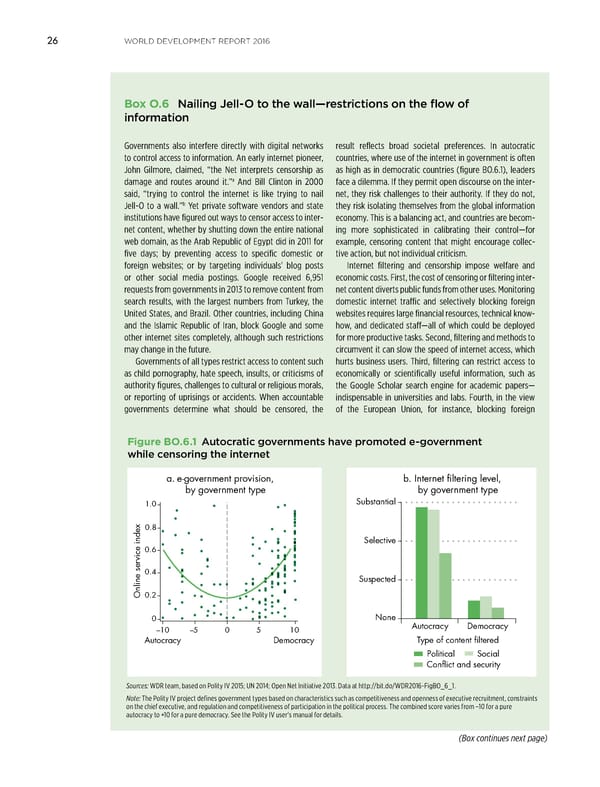WORLD DEVELOPMENT REPORT 2016 26 Box O.6 Nailing Jell-O to the wall—restrictions on the flow of information Governments also interfere directly with digital networks result reflects broad societal preferences. In autocratic to control access to information. An early internet pioneer, countries, where use of the internet in government is often John Gilmore, claimed, “the Net interprets censorship as as high as in democratic countries (figure BO.6.1), leaders a And Bill Clinton in 2000 damage and routes around it.” face a dilemma. If they permit open discourse on the inter- said, “trying to control the internet is like trying to nail net, they risk challenges to their authority. If they do not, b Yet private software vendors and state Jell-O to a wall.” they risk isolating themselves from the global information institutions have figured out ways to censor access to inter- economy. This is a balancing act, and countries are becom- net content, whether by shutting down the entire national ing more sophisticated in calibrating their control—for web domain, as the Arab Republic of Egypt did in 2011 for example, censoring content that might encourage collec- five days; by preventing access to specific domestic or tive action, but not individual criticism. foreign websites; or by targeting individuals’ blog posts Internet filtering and censorship impose welfare and or other social media postings. Google received 6,951 economic costs. First, the cost of censoring or filtering inter- requests from governments in 2013 to remove content from net content diverts public funds from other uses. Monitoring search results, with the largest numbers from Turkey, the domestic internet traffic and selectively blocking foreign United States, and Brazil. Other countries, including China websites requires large financial resources, technical know- and the Islamic Republic of Iran, block Google and some how, and dedicated staff—all of which could be deployed other internet sites completely, although such restrictions for more productive tasks. Second, filtering and methods to may change in the future. circumvent it can slow the speed of internet access, which Governments of all types restrict access to content such hurts business users. Third, filtering can restrict access to as child pornography, hate speech, insults, or criticisms of economically or scientifically useful information, such as authority figures, challenges to cultural or religious morals, the Google Scholar search engine for academic papers— or reporting of uprisings or accidents. When accountable indispensable in universities and labs. Fourth, in the view governments determine what should be censored, the of the European Union, for instance, blocking foreign Figure BO.6.1 Autocratic governments have promoted e-government while censoring the internet a. e-government provision, b. Internet filtering level, by government type by government type 1.0 Substantial 0.8 index Selective e0.6 c i v r e s 0.4 e Suspected n i l n O0.2 0 None –10 –5 0 5 10 Autocracy Democracy Autocracy Democracy Type of content filtered Political Social Conflict and security Sources: WDR team, based on Polity IV 2015; UN 2014; Open Net Initiative 2013. Data at http://bit.do/WDR2016-FigBO_6_1. Note: The Polity IV project defines government types based on characteristics such as competitiveness and openness of executive recruitment, constraints on the chief executive, and regulation and competitiveness of participation in the political process. The combined score varies from –10 for a pure autocracy to +10 for a pure democracy. See the Polity IV user’s manual for details. (Box continues next page)
 World Development Report 2016 Page 40 Page 42
World Development Report 2016 Page 40 Page 42